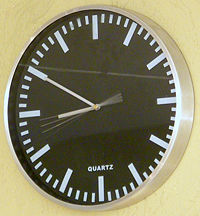Difference between revisions of "Wall clock PPM"
From Electriki
Jump to navigationJump to search (New page: == PPM - A Layman approach to accurate measurements == == why == The wall clock had been running too fast for a long time, about 10min [[Image:PPM_Wall_clock.jpg|200px|thumb|right|Te...) |
|||
| Line 2: | Line 2: | ||
| − | + | The wall clock had been running too fast for a long time, about 10min, I wondered how much. | |
| − | The wall clock had been running too fast for a long time, about 10min | + | Well I could use a stop-watch and count how long it takes to count 60sec. The problem with this is that the uncertainty of my reaction speed would have a significant impact on the result. Say I can react within 1 sec, that is also the resolution on the watch, the potential error is 1/60, or 16667PPM!! (OMG,BBQ,WTF and so on and so forth). |
| − | |||
| + | The solution was simple but brilliant (in all modesty). | ||
| + | As a time reference, the clock | ||
[[Image:PPM_Wall_clock.jpg|200px|thumb|right|Test subject - doing time-warp]] | [[Image:PPM_Wall_clock.jpg|200px|thumb|right|Test subject - doing time-warp]] | ||
Revision as of 20:04, 29 March 2010
PPM - A Layman approach to accurate measurements
The wall clock had been running too fast for a long time, about 10min, I wondered how much. Well I could use a stop-watch and count how long it takes to count 60sec. The problem with this is that the uncertainty of my reaction speed would have a significant impact on the result. Say I can react within 1 sec, that is also the resolution on the watch, the potential error is 1/60, or 16667PPM!! (OMG,BBQ,WTF and so on and so forth).
The solution was simple but brilliant (in all modesty).
As a time reference, the clock
